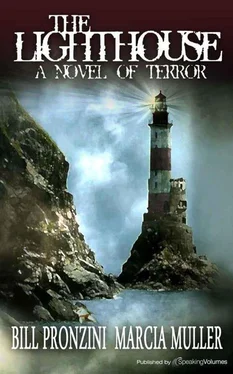“Well. you were so quiet. What were you thinking?”
“That I might like to paint this someday, if I have time. This view of the lighthouse.”
Jan raised an eyebrow: the Alix Kingsley-Ryerson who had painted seriously was someone out of the past, someone he’d never known. But he said, “Good. That’s good,” and smiled at her, and she knew he was relieved that her first impression had been favorable. Behind his born-rimmed glasses, his eyes were bright-that electric-blue color that seemed so vivid when he was excited. They had been that way for almost a week now, ever since the packing and last-minute preparations for the move had begun. The boyish eagerness eased her mind. For much of the year he had been mired in one of his periods of depression, and more prone than ever to severe headaches-working too hard at the university for some reason known only to him. Unlike hers, his way was to bottle up things inside, so tightly sometimes-this last time-that she found it impossible to draw him out of himself. It hadn’t been until his application to the Oregon State Parks and Recreation Division had been approved that his depression started to lift. Now he seemed his old self again. The next year meant a great deal to him, more than she had imagined when he first broached the idea of an early sabbatical.
Jan was looking out toward the lighthouse again, bent forward slightly, his flaxen hair streaming out behind him. The wind was in his lighter blond beard too, ruffling it and pooching it out on the sides. Not for the first time, she thought he must have Viking blood. He was headstrong, forceful, independent, tenacious-all Viking characteristics. And he looked like a Viking; it required very little imagination to picture him at the helm of a Norse ship out of Novgorod, leaning into the wind with his hair streaming behind him that way. Jan the Bold. Of course, he was getting a little thick around the middle-the re-suh of his fondness for beer. Jan the Paunchy.
She laughed in spite of herself, and he said, “What’s funny?” with his gaze still on the Cape Despair Light.
“Nothing, really. I’ll tell you later.” She felt a surge of affection for him and thought: It’s going to be all right. She squeezed his arm. “I’m freezing. Let’s get back in the car.”
“Right.”
He got them moving again. The road dipped down through a hollow where clumps of tule grass stretched away on both sides. Odd-looking grass: hundreds of big round tufts of it, like an army of porcupines with their backs arched, their quills drooping, their heads tucked down out of sight. As if waiting for something. Night? The right time to mass an attack on the few sheep that grazed among them? Fanciful thought, Ryerson-too many children’s-book illustrations.
Once they came out of the hollow, climbing gradually again, the blacktop ended and the road degenerated into a gravel surface pocked with potholes. Jan had to slow the station wagon to a crawl. Still, there was no way to avoid all of the holes. The rough ride dislodged something in the mass of suitcases and clothing bags and cardboard boxes that jammed the back half of the station wagon; it made a clanging noise every time they rolled through one of the chucks.
The terrain had changed too, grown more barren. There were few trees this far out on the cape-just a scattering of cypress and hardy evergreens. No meadowland, as there had been for most of the previous two miles from the county road, and consequently no more sheep. There were large sections of bare ground, rocky and dun-colored; the patchy grass was thicker, and weedier, the Oregon grape and prickly broom that covered the rest of the cape grew only in isolated clumps out here. Most of the leaden sea and part of the shoreline were visible to the south, less of the sea and little of the shoreline to the north. When Alix twisted around again she could no longer see either Hilliard Bay or the tiny hamlet along its inner shore.
The lighthouse remained visible ahead of them, even though the road serpentined along the narrowing headland. She watched it grow, take on definition. Cape Despair Light. Built in 1860, when the cape bore its original name-Cap Des Peres, the Cape of the Fathers, after a pair of Basque sheepherders who had established the first homesteads on this lonely part of the Oregon coast and who each happened to have fathered eleven children. But Cape Despair was a much more appropriate name. Even after construction of the lighthouse, half a dozen ships had foundered and sunk in the savage storms that battered the cape and the rough, rock-strewn waters that lay off of it; close to a hundred men had died in those shipwrecks, forty-seven of them in 1894 when a coastal steamer ran afoul of the rocks in a dense fog. It was after that tragedy that mariners had dubbed it Cape Despair, and it was still commonly called that despite the Cap Des Peres designation on maps and in guidebooks.
They were only a few hundred yards, now, from the flattish tip of the headland on which the buildings sat. Alix leaned forward, pointing. “What’s that big outbuilding on the left?”
“Used to be housing for the maintenance crew,” Jan said. He had been here twice in the past three months for short visits. But he had known every detail of its history before that, of course; there was little about any North American lighthouse that he didn’t know. “Coast Guard built it in 1940. Garage, workshop, and storage now.”
“The other two?”
“The small one near the light is where the generator is housed. Cordwood, too. The one lower down, on the far side, is the pumphouse for the well.”
“All the comforts of home,” she said.
“It’s not so bad. The well pump is electric; runs off the generator. And there’s a phone line that got put in before the funding ran out. I told you that, didn’t I?”
“Yes. And thank God for it. We won’t feel so cut off up here if we can talk with our friends and my family once in a while.”
“Just so you don’t run up huge bills.” But his smile told her he was only teasing.
The road petered out in a gravelly, rutted clearing that was supposed to have been widened and graded into a parking area for visitors. At the far end was a gate and a whitewashed board fence that extended in a somewhat erratic line past the buildings on both sides, almost to where the cliffs began their descent to the sea. The elevation here was a hundred and twenty feet. The tower rose another sixty feet; the light, when it had been operational, could be seen from a distance of twenty miles.
Jan stopped before the closed gate. The force of the wind was considerable on the exposed headland-enough to shimmy the Ford, as heavy and laden as it was. Alix felt the chill of it when he got out to open the gate; it made her shiver. She hadn’t expected it to be this windy or this cold, not on a reasonably clear and otherwise warm late-September day. If it was like this on a good day, what would it be like during a winter storm? The thought was a little unsettling; she put it out of her mind.
Jan drove them over more rutted gravel to where an old rust-red pickup was parked near the largest of the outbuildings. The bed of the pickup was loaded with boxes, a chest of drawers, an old wheelbarrow. When he shut off the engine Alix could hear the wind skirling outside, the hissing pulse of surf against the rocks far below.
“That’s Bonner’s pickup,” Jan said. He sounded the horn a couple of times; no one appeared. “Well, where is he? Inside somewhere sulking, I suppose.”
“You can’t blame him if he is, can you? We’re taking his job away from him.”
“I don’t have much sympathy for him.”
“No?”
“No. He’s unpleasant and lazy. Look at all this. He hasn’t kept it up.”
“He’s only a caretaker, not a maintenance man…”
Читать дальше












